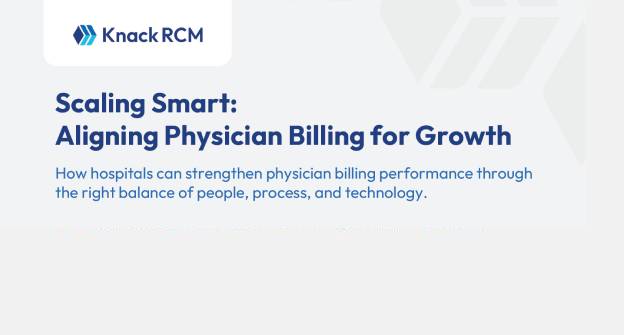Providers Who Outsourse RCM Can See Big Returns

Financial stability within the healthcare industry hinges on practices securing timely and accurate payments for their services. Without reliable revenue, the broader challenges surrounding healthcare costs, quality, and accessibility persist.
Yet getting paid isn’t as straightforward as it should be. Revenue cycle management (RCM) encompasses a maze of processes—often depicted as multi-step charts that seem more suited for an engineering manual than a medical practice. RCM has evolved into a $155 billion industry in the US, with thousands of specialists dedicated to mastering it.
For most healthcare practices, managing RCM in-house can be overwhelming. But with the promise of cost savings, enhanced efficiency, and access to specialized expertise, more and more providers are exploring the benefits of outsourced RCM for physician practices.
Outsourced RCM for Physician Practices is Gaining Traction
The healthcare industry has significantly shifted towards outsourcing RCM in recent years, with 61% of providers planning to use third-party RCM solutions. This shift is driven by the need to reduce administrative burdens, the desire for more predictable cash flow, and the growing complexity of medical billing and coding.
When you outsource RCM, you’re essentially bringing in a team of experts who specialize in navigating the intricacies of healthcare revenue cycles—allowing your practice to increase its profitability while focusing on what matters most: patient care.
But before you jump into outsourced RCM for physician practices, you must consider whether it’s the right move for your practice.
Factors to Consider Before Outsourcing RCM
1. Current In-House Abilities
Start by assessing the strengths and weaknesses of your existing RCM processes. Do you have the necessary technology, expertise, and personnel to manage RCM effectively? Can you stay current with frequent changes in coding, billing, and payer requirements?
According to the book Benchmarking Successby the Medical Group Management Association, a typical practice needs 2.7 billing staff members for every physician to run smoothly. Other sources suggest 1-2 trained in-house billers and coders per provider. Outsourcing is a better option if your practice is too small to support these RCM needs.
2. Cost-Benefit Analysis
Outsourcing RCM for physician practices often proves to be more cost-effective. A 2021 MGMA survey found that outsourced billing costs just 5.4% to collect a dollar, while in-house billing can cost up to 13.7%.
The increased cost for in-house billing is especially true for larger practices that require a bigger billing and coding team. Each additional in-house employee brings a significant financial commitment—not just in terms of salary, but also in employee benefits and training. On top of that, there’s the ongoing investment in billing software.
3. Vendor Values, Experience and Reputation
Outsourcing RCM can affect patient interactions, particularly with billing inquiries. When managed in-house, you can ensure a patient-centric approach. When outsourced, choosing a vendor that aligns with your practice’s values and prioritizes patient satisfaction is vital.
When selecting an RCM partner, it’s also crucial to research their background and experience. Look for vendors with a track record in managing outsourced RCM for physician practices similar to yours. Testimonials, case studies, and client references can provide valuable insights into a vendor’s reliability and effectiveness.
What to Look for in an RCM Partner
If you’ve decided to outsource RCM, it’s vital to remember that not all vendors are created equal. Here are some things to look for in a partner:
- Specialization in Healthcare: Choose a partner with expertise in healthcare, particularly in your specific practice area. Vendors with experience in your specialty understand the unique challenges and nuances of your revenue cycle.
- Technology and Innovation: Look for RCM vendors who use AI-driven analytics, automated billing, and other tools to streamline processes and reduce errors. Ensure that their systems integrate seamlessly with your existing management software.
- Transparency and Reporting: Clear communication and transparency are essential in any outsourcing relationship. Your RCM partner should provide regular, detailed reports on financial performance, offering actionable insights for your practice.
- Compliance and Security: Compliance and security are non-negotiable in healthcare. Ensure your RCM partner adheres to healthcare regulations, such as HIPAA, and employs robust data security measures to protect patient information.
How to Plan for a Smooth Transition
1. Develop a Transition Plan
Moving from in-house to outsourced RCM for physician practices is a significant change, and careful planning is essential. Create a detailed roadmap that outlines timelines, key milestones, and the roles of all stakeholders involved. Engage with stakeholders early in the process to ensure buy-in and address any concerns.
2. Training and Support
Your staff will need training on new processes and systems. Work with your RCM partner to organize training sessions that cover all aspects of the new workflow. Ongoing support from the vendor will be critical during the transition phase to ensure a seamless changeover, so make sure this is something the vendor offers.
3. Data Migration
The secure and accurate migration of your data is a top priority. Collaborate closely with your RCM partner to plan for data transfer, and consider running parallel operations during the initial phase to mitigate risks. Proper planning and execution of data migration will minimize disruptions to your physician practice.
4. Continuous Monitoring and Evaluation
Once the transition is complete, the work doesn’t stop there! Establish a system for ongoing monitoring and evaluation of the outsourced RCM’s performance. Regularly review key metrics to ensure that the arrangement continues to meet your practice’s needs and contributes to your financial goals.
Knack Global’s Outsourced RCM for Physician Practices
Choosing the right approach to RCM is crucial for the success of your practice. While keeping RCM in-house offers a certain level of control, outsourcing to experts like Knack Global can provide significant advantages in cost savings, efficiency, and accuracy.
With over 15 years of experience, we have been a trusted partner for healthcare providers, helping them streamline billing, accelerate payments, and maximize revenue. By leveraging Knack’s comprehensive RCM solutions, you can focus on what matters most—providing excellent care to your patients—while we handle the complexities of billing and collections.
Recent Posts

Why You’ll Never Outpace the Payers — and What to Do Instead
Read More
Scaling Smart: Aligning Physician Billing for Growth
Read More
Scaling Without Breaking: How to Strengthen Physician Billing as Your Network Grows
Read More